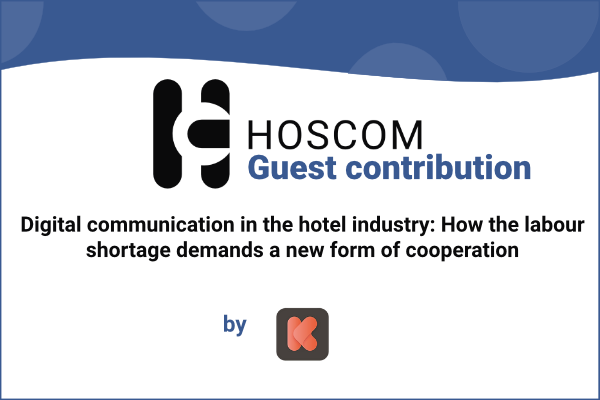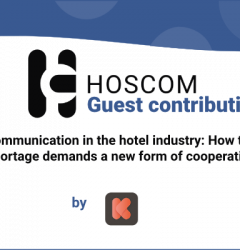01 Jun

Digital communication in the hotel industry: How the labour shortage demands a new form of collaboration
Whenever people interact with each other and exchange information through language or gestures and facial expressions, we speak of communication. We have all heard the famous sentence “You cannot not communicate” by Paul Watzlawick. But we have also experienced for ourselves the consequences of inadequate communication. In private life, poor communication causes relationships to break down; in the work environment, it leads to stress, dissatisfaction and failure.
Especially in the hospitality industry, where service by people for people and the associated interaction determine the business model, communication is a success factor. Because the general conditions are changing and the shortage of labour determines the current situation in the hotel industry more than ever, we look at what needs to develop in communication and what new ways of cooperation are opening up for this. For a sustainable hotel industry and satisfied guests and employees in the long term.
Communication is king
In almost all areas of the hospitality industry, complexity is increasing. Competition is increasing, marketing strategies are becoming more sophisticated and the range of offers more diverse. This is accompanied by an increasing flood of information that has to be managed and structured in everyday business.
On the one hand, communication with the guests must be ensured. During the entire customer journey – from the inspiration and booking phase through to the stay – it is important to arouse emotions, provide information and strengthen the relationship with the guest at the right point.
Communication with employees, within teams and across departments is at least as relevant. Because this is about more than a structured exchange of information and thus ensuring work processes. The degree and type of communication is also decisive for staff leadership, appreciation and loyalty. In other words, if you want to manage a hotel successfully, you have to involve all employees and offer them an open and respectful working environment. This is because the changing demands and needs of employees, as well as the labour shortage, require a rethink of management in the hospitality industry. Communication is an effective key to this.
The impact of good communication in hotel operations
Why is it worthwhile for hoteliers and managers to reflect on their internal (employee-facing) communication strategy and habits?
#1
Clear, standardised communication ensures professionalism, structure and productivity. The better the departments can communicate with each other and the more efficiently processes are designed, the higher the quality of services.
#2
The satisfaction of guests as well as employees depends to a large extent on communication. This starts with the tone of voice and charisma (after all, you can’t not communicate) and extends to availability. The framework for conversations is also decisive. Is it always just between the door and the corner or are there regular meetings in which all matters are discussed?
#3
Communication is an essential factor for corporate culture. This exists regardless of whether it is addressed or not. The following questions can serve as guidelines for an actively shaped corporate culture:
– How do we want to communicate or maintain a common approach?
– What values determine our communication?
– What rules do we set for meetings?
– What kind of culture of error prevails in our hotel?
– How can employees get involved?
#4
There are more vacancies in the hospitality industry than ever before. In Germany alone there are over 28,000 (source: Handelsblatt, August 2022). The solution: retain existing employees across seasons and in the long term. To achieve this, regular, transparent and appreciative communication is helpful. This is because it generates loyalty and enthusiasm when employees act on their own responsibility, actively contribute and identify with the company’s goals and strategies. A close exchange and targeted questions to employees are essential for this. And it pays off: because every employee who stays saves the hotel an average of one year’s salary in search, transfer and training costs (Competence Centre “Employee Retention”, 2016).
#5
All of the points mentioned ultimately have a positive effect on revenue and the success of the company. Structured processes lead to less time wasted and additional costs, satisfied guests spend more money, a strong corporate culture positions the hotel as an attractive employer on the labour market and enthusiastic employees stay and thus save money. Communication is therefore not only a “soft” factor for a constructive and benevolent working environment, but also has a positive economic impact.
Digital solutions are going to ease communication
Especially in the current situation, simple and efficient solutions are needed to strengthen communication and counteract the lack of employees (and its negative consequences). It is advisable to strengthen communication in two directions:
#1
To provide all hotel employees with comprehensive information so that they can carry out their work smoothly. From excursion tips for guests to special features for changing beds, HOSCOM clearly displays the data in a software solution and provides employees with all relevant information on their smartphones, tablets and PCs. This leads to professional work, clear structures and efficient processes.
#2
Communication is much more than the exchange of information. It enables us to act quickly in stressful times, to keep in touch with employees in all departments and to retain them in the long term. Kibun provides software to regularly treat employees with appreciation and to easily collect feedback. Through continuous, digital employee surveys in 1 – yes, that’s right – minute, the management receives a comprehensive picture of the mood and satisfaction of the employees, from which targeted measures can be derived. So that employees are happy to stay and recruit new colleagues.
About the author

Anna Bauer - Founder & CEO Kibun.io
Innovative, dynamic, visionary: We know about the changes in the world of work and the needs of generations Y and Z, which will determine the labour market in the near future. Our vision: to support companies in taking further steps in their development and to raise the corporate culture to the next level in order to retain employees in the long term. With the Kibun software, we create a comprehensive and transaparant analysis tool for entrepreneurs and HR professionals for the various areas in the company that influence employee satisfaction.
For more information, please visit the Kibun website or contact us directly by email at info@kibun.io.


